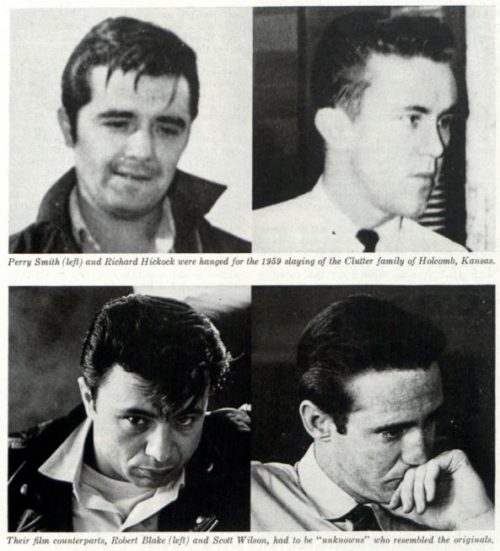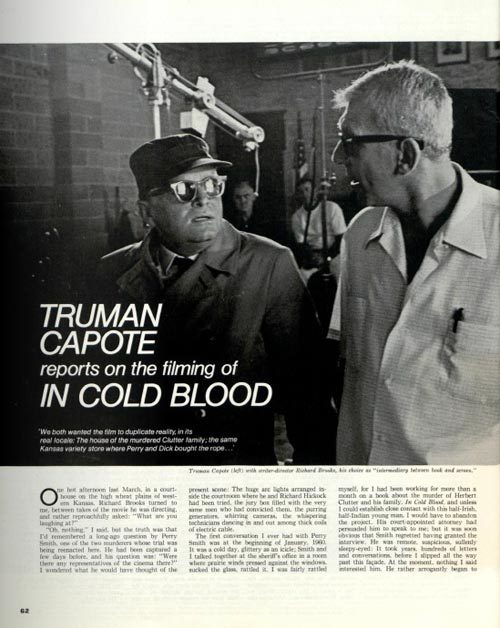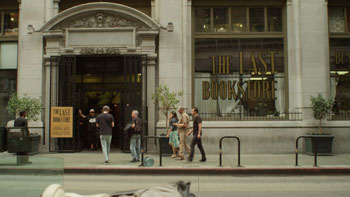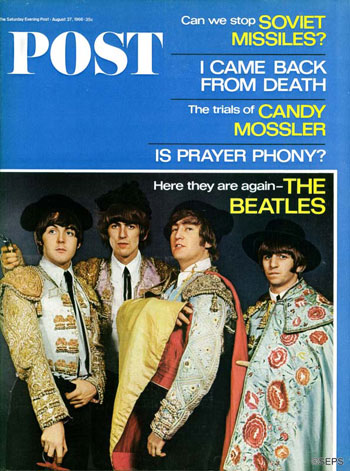50 Years Ago: Capote Writes for the Post
 Truman Capote’s only story in The Saturday Evening Post appeared 50 years ago. After the success of his true crime novel, In Cold Blood, Capote had visited Holcomb, Kansas once more for the production of the film adaptation.
Truman Capote’s only story in The Saturday Evening Post appeared 50 years ago. After the success of his true crime novel, In Cold Blood, Capote had visited Holcomb, Kansas once more for the production of the film adaptation.
His account of the gruesome murders of the Clutter family in the “high wheat plains of western Kansas” shocked the country as the story was serialized in The New Yorker in 1965. Richard Brooks directed the movie, and its adherence to authenticity was striking to the prominent author. Capote recounts meeting the actors set to portray Perry Smith and Richard Hickock, the then-executed killers he had spent years interviewing: “Meeting them, having to be around them, was not an experience I care to repeat. This has nothing to do with my reaction to them as private individuals: They both are sensitive, seriously gifted men. It’s simply that, despite the clear physical resemblance to the original pair, their photographs had not prepared me for the mesmerizing reality.” The actors, Robert Blake and Scott Wilson, were uncanny lookalikes of the Clutters’ killers, but perhaps more unsettling was the film’s obedience to real-life locations in its depiction of the events.

It was at Capote’s own insistence, as he claims in his write-up, that the film was shot, truly, on-location. The Finney County Courthouse was the site of the trial, and a Kansas convenient store where the killers had purchased tape and rope appeared in the film as well. Even the Clutter farmhouse, the scene of the quadruple murders, became a movie set. The family’s original furniture and décor was used, as Capote reports: “Yet eight years have passed, the Clutter family are gone, and Dick is dead, but the Venetian blinds still exist, still hang at the same windows. Thus reality, via an object, extends itself into art; and that is what is original and disturbing about this film: Reality and art are intertwined to the point that there is no identifiable area of demarcation.”
Capote’s book, and the subsequent film, launched the true crime genre into the American consciousness. The trailer for In Cold Blood claimed it to be “a terrifyingly true story of our generation, a generation both repelled and attracted by violence,” but the momentum of true crime since the film’s release in 1967 hints at a much more universal appeal. Helter Skelter, Summer of Sam, and Monster have followed the format for taking on real-life murderers as subjects, and — since TV is king these days — FX’s aptly-named American Crime Story tells a new chillingly true story each season. American audiences’ obsession with a narrative “based on real events” lends credence to Capote’s suspicions that “reflected reality is the essence of reality, the truer truth.”

News of the Week: The Big Bookstore, Bad Comments, and the Life of the Little Red-haired Girl
Welcome to the Last Bookstore

Josh Spencer was a talented athlete who was hit by a car while on his moped several years ago. It left him a paraplegic, forcing him to completely rethink his life. What did he do? He opened up a bookstore in Los Angeles called The Last Bookstore, a clever name since so many bookstores have closed in the past decade or so (though, thankfully, independent bookstores seem to be making a comeback as the big chains struggle). It has become one of the largest indie bookstores in the world, and from what I see at the website, it’s one I could browse in for days. Actually, I’d probably move in there if he let me.
Spencer and his store were featured at The Atlantic last week, along with this great short documentary by Chad Howitt.
So Long Comment Sections?
I have a love/hate relationship with the comment sections on websites. I love the idea of them, and I frequent a few that are still civil and normal and enjoyable. But at the same time, I see too many comment sections — most of them, actually — that are sick and disgusting and rude and are frequented by some of the most evil people in the world. You’ll see these people on political sites, general news sites, YouTube, and even Amazon, where you’d think the comment section would be better. It all comes down to moderation. There’s no reason why we can’t have comment sections, but many sites don’t want to bother to police them.
But I guess it doesn’t matter because many comment sections are going away. NPR has just gotten rid of them, following in the steps of places like Reuters, Popular Mechanics, The Verge, The Week, and Recode. Some of these sites got rid of comments because of the aforementioned horrible commenters, but some sites are getting rid of them simply because the conversation has moved to Facebook and Twitter. Because, you know, people are more civil on social media. Ahem.
Don’t worry, The Saturday Evening Post still has a comment section! We have the best readers and we love seeing comments here! (This is your cue to leave a comment at the bottom of this column.)
RIP Donna Wold, Jack Riley, Steven Hill, and Irving Fields
If you’re a regular reader of Peanuts, you know Donna Wold. Or at least you know the character based on her. She was Charles Schulz’s inspiration for the Little Red-Haired Girl, the one he could never have. (They dated for a while, and he proposed, but she eventually married a firefighter.) Wold passed away earlier this month at the age of 87. She had four kids of her own, many grandchildren and great-grandchildren, and 40 foster kids, several of whom she named after Peanuts characters.
Jack Riley was probably best known as Dr. Hartley’s neurotic patient Mr. Carlin on The Bob Newhart Show, but he also appeared on Seinfeld, Friends, Rugrats, Married … With Children, Night Court, and a million more shows. Riley passed away in Los Angeles at the age of 80.
If you were a fan of Mission: Impossible or Law and Order, you’ll remember Steven Hill. On the former he played Daniel Briggs, the leader of the IMF for the first season, before Peter Graves took over as Phelps. On Law and Order he played District Attorney Adam Schiff for 10 seasons. Hill was also in the Navy during World War II and was an acclaimed stage actor. He died earlier this week at the age of 94.
I never knew that the reason CBS let him go from Mission: Impossible was because he took time off because of his Jewish faith, which eventually led to filming conflicts.
Irving Fields? He’s actually one of the more fascinating entertainers of the past several decades. A pianist and songwriter, he wrote songs like “Miami Beach Rhumba,” which became a standard and was used by Woody Allen in Deconstructing Harry. His albums had titles like “Pizza and Bongos” and “Bagels and Bongos,” and he appeared on several variety shows in the ’50s and ’60s. He also wrote songs performed by Dinah Shore and Guy Lombardo.
But the most interesting thing about Irving Fields is that, even though he passed away at the age of 101, he was still performing in New York City clubs and lounges until just a few months ago. CBS did a nice profile of Fields in January.
Fields was so with it he even wrote a song about YouTube:
This Week in History: First Televised Major League Baseball Game
The first televised game aired August 26, 1939, on a new station, W2XBS, which later became WNBC-4. Around 3,000 people watched a doubleheader between the Brooklyn Dodgers and Cincinnati Reds at Ebbets Field. It wasn’t what we see today. There were only two cameras, there was no instant replay, and this was decades before people dressed as hot dogs raced each other.
This Week in History: Hawaii Becomes the 50th State
For many years I thought that Alaska was the 50th state. I have no idea why I thought this, but in fact Hawaii became the 50th state on August 21, 1959. Book ’em, Danno.
For the record, Alaska became the 49th on January 3, 1959.

(Photo by Roger Higgins, Library of Congress Prints and Photographs Division)
This Week in History: Truman Capote Dies
I recently watched the two movies based on Truman Capote’s reporting on the Clutter family murders that eventually became his groundbreaking book In Cold Blood. Capote, from 2005, is the darker, more serious movie, with a terrific performance by the late Philip Seymour Hoffman. But 2006’s Infamous is really good too. It has more lighter scenes than Capote, and while Hoffman gave a great performance as the writer, Toby Jones somehow becomes Capote. Both movies are well worth seeing.
Capote really was never the same after that book. He wrote many articles and essays (and his book of letters is really fantastic), but he never wrote another major book. I grew up knowing him as that guy on The Dick Cavett Show or The Tonight Show. Sometimes he was obviously out of it, and it was a rather sad end when he died on August 25, 1984, at the home of Johnny Carson’s ex-wife Joanne. He was only 59. It was a sad end and much too young, but it’s worth remembering that he actually was a great writer.
Oh, if you’re interested in owning his ashes, they’re coming up for auction.

Photo by Bill Francis
August 27, 1966
It Was 50 Years Ago Today (Actually, Tomorrow)
This is a new regular feature, where I’ll look back at what The Saturday Evening Post had on its cover 30, 50, 75, 100 years ago. This week in 1966 — August 27, to be exact — the Beatles graced the cover in funny costumes, along with stories about whether or not we could stop Soviet missiles, the sordid trial of Candy Mossler, and a piece on whether or not prayer is “phony.”
It’s interesting that even though it said “The Saturday Evening Post” in small letters at the top, the logo for the magazine was just “POST.” But everyone knew what magazine it was.
For the Love of Bananas
Hey, here’s another thing that happens on August 27: it’s Banana Lovers Day. This is not to be confused with National Banana Day, which is celebrated on April 15. You’re allowed to like bananas on that day but you can’t love them. (April 15 is also Tax Day, but I assume the two events are unrelated.)
Here’s a recipe for banana bread with toasted walnuts. I’ve never understood the combining of bananas and walnuts in recipes, so I make mine without them (the walnuts, not the bananas).
Here’s a recipe for banana sunflower cookies, which makes me realize that I’ve never had a banana-flavored cookie. Banana bread? Yes. Banana cream pie? Yes. Banana split? Yes. But I’ve never had a banana cookie. But it’s not the most creative way to eat bananas. That award might go to these grilled bananas with buttered maple sauce and almond toffee.
Next Week’s Holidays and Events
U.S. Open starts (August 29)
Sick of rained-out matches? This year a new roof debuts on Arthur Ashe Stadium, as well as a new Grandstand court.
Why you should say “rabbit rabbit” on September 1
Say those words (or a variation, like “rabbits” or “rabbit rabbit rabbit”) on the first of every month and you’ll have good luck all month long.
National Emma M. Nutt Day (September 3)
You’ve probably never heard of her, but she was the very first female telephone operator, a position she held for over three decades. Women in that position had to be single and have long arms.